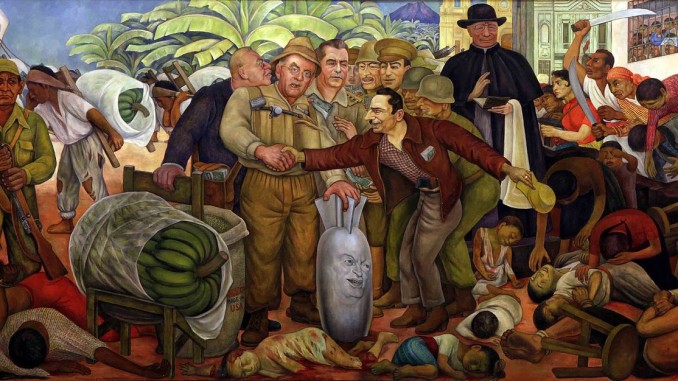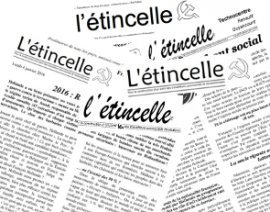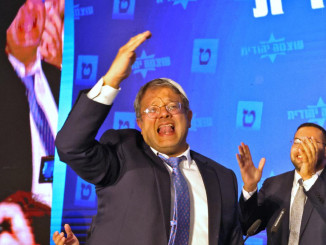
On June 27, 1954, the democratically elected president of Guatemala, Jacobo Árbenz Guzmán, was deposed in a CIA-sponsored coup to protect the profits of the United Fruit Company. The horrifying consequences of this action continue to weigh heavily today. The population of Guatemala, and most particularly the Maya population, has suffered decades of brutal repression and war as a result of this coup. It stands as a lesson as to what the U.S. government really means by saying it defends “liberty and democracy” for all.
In the early 1900s Guatemala had never known a democratic election, and Guatemalan presidents could all be depended on to defend the interests of one giant U.S.-based landowner, the United Fruit Company. So widespread was the reach of this company, that it was nicknamed The Octopus (El Pulpo) throughout the Caribbean and Central and South America. President Jorge Ubico, a dictator who ruled Guatemala from 1931-1944, was among the most devoted to United Fruit. By 1950, United Fruit was the largest landowner in Guatemala, and had control over the main port to the Atlantic Ocean, Puerto Barrios, as well as the trains to get there. Ubico secured the company’s interests and had nothing but contempt for the working population, which was overwhelmingly indigenous.
He forced Guatemala’s huge population of landless Maya people to work on government projects instead of paying taxes. He made all Indians carry passbooks and used vagrancy laws to compel them to work for the big landowners. Ubico also had a habit of jailing his opponents and stifling all opposition. The U.S. government never cared so long as U.S. investment in the country continued to be profitable.
Eventually, the population rose against Ubico. In 1944, a coalition of middle-class professionals, teachers and junior officers launched a pro-democracy movement. The movement won the backing of the country’s growing trade unions, and the popular uprising that followed forced Ubico to resign.
In 1945, Guatemala had its first democratic election. The winner was Juan José Arévalo, a university philosophy professor and author who had been living in exile for speaking out against repression. Arévalo was a captivating speaker, tall and handsome. He captured the hearts of Guatemalans who wished for a more just society.
After six years in office, in 1951, Arévalo was succeeded by Jacobo Arbenz Guzmán, a young military officer. Jacobo Arbenz promised to take social change one step further than Arévalo. Guatemala had tremendously fertile soil, but two percent of the landholders owned 72 percent of the arable land, and only a tiny part of these holdings was under cultivation. Arbenz proposed to carry out land reform and distribute lands that were not under cultivation to landless peasants, and further Guatemala’s independence by creating a country with a literate middle class.
Far from radical – Arbenz was outspokenly anti-communist – this land reform confiscated only property that was larger than six hundred acres and not in cultivation. The confiscated lands were to be divided up among the landless. In addition, the owners were to receive compensation based on the land’s assessed tax value and they were to be paid with twenty-five-year government bonds. The peasants were to receive low-interest loans from the government to buy their plot of land. But the confiscated lands represented half the private land in the country and more importantly, they included the vast unused holdings of the United Fruit Company, which owned some 600,000 acres, most of which lay fallow.
Arbenz even offered $1.2 million as compensation to United Fruit, a figure based on the tax value that United Fruit’s own accountants had declared, before the land reform was passed. United Fruit and the U.S. State Department demanded $16 million. When Arbenz refused, Secretary of State John Foster Dulles and CIA Director Allen Dulles convinced President Eisenhower that Arbenz had to be removed from office. The Dulles brothers were far from neutral in this. They were both former partners of United Fruit’s main law firm in Washington. On their advice, Eisenhower authorized the CIA to organize “Operation Success,” a plan for the armed overthrow of Arbenz. The agency selected Guatemalan colonel Carlos Castillo Armas to lead the coup. It financed and trained Castillo’s rebels in a nearby dictatorship, Somoza’s Nicaragua, and it backed up the invasion with CIA-piloted planes. Castillo Armas’ military arrested more than nine thousand Guatemalan supporters of Arbenz during and after the coup.
Of course, Washington recognized the new government immediately, and rewarded Armas with piles of foreign aid. That foreign aid to Guatemala continues to this day. Castillo outlawed more than five hundred trade unions and returned more than 1.5 million acres to United Fruit and the country’s other big landowners. For the next four decades, Guatemala’s people suffered from government terror without equal in the modern history of Latin America. As the population fought to defend its land, the government engaged in mass killings, torture, and a reign of terror until the mid 1990s.
Let this be a lesson to those of us who are confused by the U.S. government’s insistence that it defends freedom and democracy. The only freedoms the U.S. government has ever shown any interest in around the world is the freedom of U.S. corporations to extract profits from the world’s peoples and lands, and to use terror in the form of bombs and guns against those who have opposed them. Witness Iraq, the lie of “weapons of mass destruction” followed by regime change, supposedly to bring freedom and democracy to the Iraqi people while in fact allowing for a feeding frenzy of profiteering in an oil-rich country.
featured image credit: Wikimedia Commons




